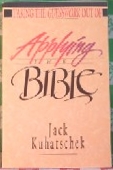Taking the Guesswork out of Applying the Bible. By Jack Kuhatschek. Downers Grove, IL: InterVarsity Press, 1990. 163 pp. Paper, $6.95.
Many evangelical Christians recognize the need for applying the Bible to their daily lives. But until now, guidelines for application have been restricted mostly to the final chapter of books on the subject of personal Bible study. Applying the Bible is entirely devoted to this often overlooked aspect of the Bible study process.
The organization and content of this volume are simple and clear. An opening chapter defines the direction of the book. The intended audience is the layperson. The purpose is to explain the “how to’s” of application. And the method is to use passages which seem outdated and irrelevant. In the words of the author, “If we can learn a method for applying the more difficult passages, that same method will work with the easier passages as well” (p. 10).
The rest of the book falls into two parts. The first chapter in Part I discusses the goal and principles of application. Subsequent chapters establish three steps for application: (1) determine the original situation; (2) determine the broader principle the author applied to his specific situation; and (3) apply the broader principle to the specific situation we face. Part II shows how these guidelines can be used for biblical commands, examples, and promises.
The book makes a positive contribution to the field of Bible study methodology. The original setting of a passage is often depicted so as to facilitate proper interpretation. Because of the original setting, the fleece Gideon placed before the Lord is rightly seen to be an example of unbelief rather than a pattern for finding God’s will (p. 122). For the same reason, to “test the spirits,” as 1 John 4:1–3 commands, has nothing to do with determining demon possession (p. 40). While the book is given over to application, it indirectly and repeatedly leads the reader through proper stages of interpretation as well. This gives interpretation its proper place as the forerunner of valid application. One might even argue that the process of finding eternal principles in any passage is more appropriately an aspect of the interpretation stage of Bible study rather than the application stage.
There are also some contributions to Free Grace theology. For one thing, the author is a realist in acknowledging that, according to 1 Corinthians 3 and Hebrews 5, some Christians are “worldly” (carnal). These are viewed as Christians who have never grown spiritually (pp. 19–20). The author also believes that God’s love is what motivates us to desire to obey His commands (pp. 91–92). Finally, a direct statement is made that the NT believer is not under the old covenant (p. 94).
Corresponding weaknesses can also be noted. Although free from the Mosaic Law, the reader is instructed to find principles in these laws that can govern daily living. But if we are obligated to keep the principles of the Mosaic Code, is not this much like being under the law? While we may not keep the Sabbath (Friday-Saturday) as the Jews were commanded, are we obligated to keep by principle one day a week as a “Sabbath”? Paul implies that there is no obligation in this regard (cf. Rom 14:5). This point deserves more clarification in the book.
A bit more disappointing is the author’s implications when discussing the passage about the rich young ruler (Matt 19:16–22). In finding the principle of the story which applies to us, he states: -What Jesus demands is that we put Him first. If we have made power our god, we must be willing to give up power. If we worship sex or fame, we must be willing to renounce them as well. Nothing must be allowed to usurp Jesus’ rightful place as Lord of our lives” (pp. 102–103). Since the young ruler was seeking eternal life, the inference could be made (although it is not directly stated) that renunciation of sin and self are prerequisites to being born again. On the other hand, the author may have merely sought a principle to apply to those who are already saved.
Whatever minor weaknesses this book might have, it is a highly recommended supplement that fills a void left by most books on personal Bible study.
John F. Hart
Assistant Professor of Bible
Moody Bible Institute
Chicago, IL

